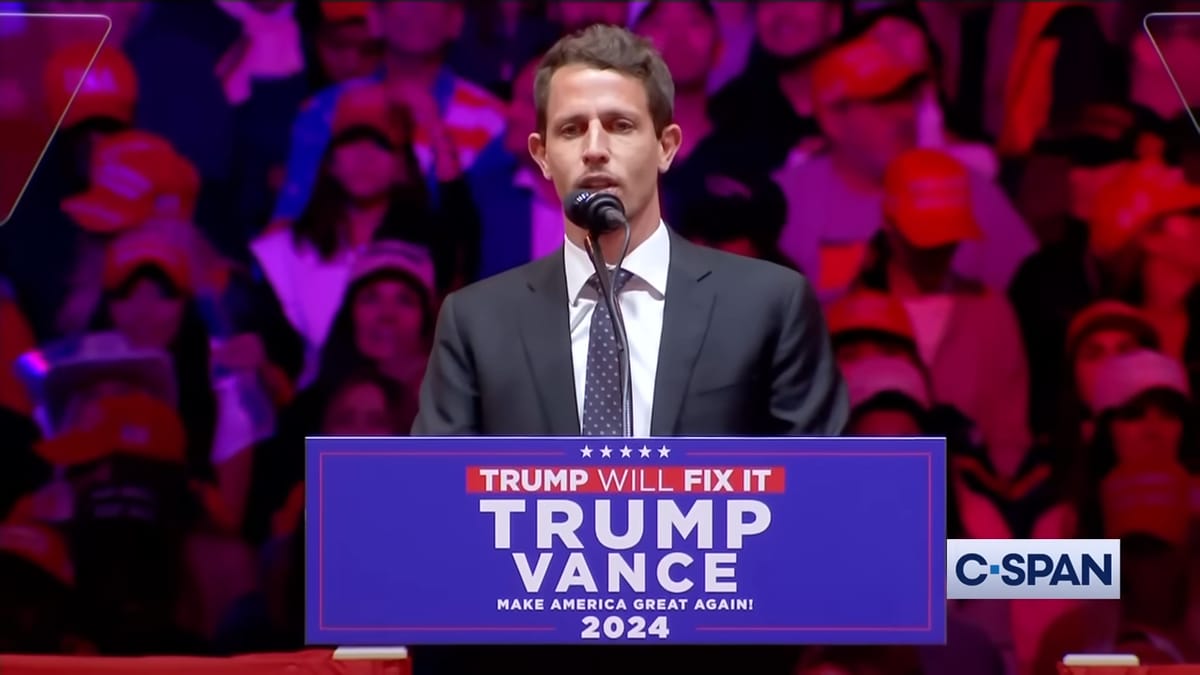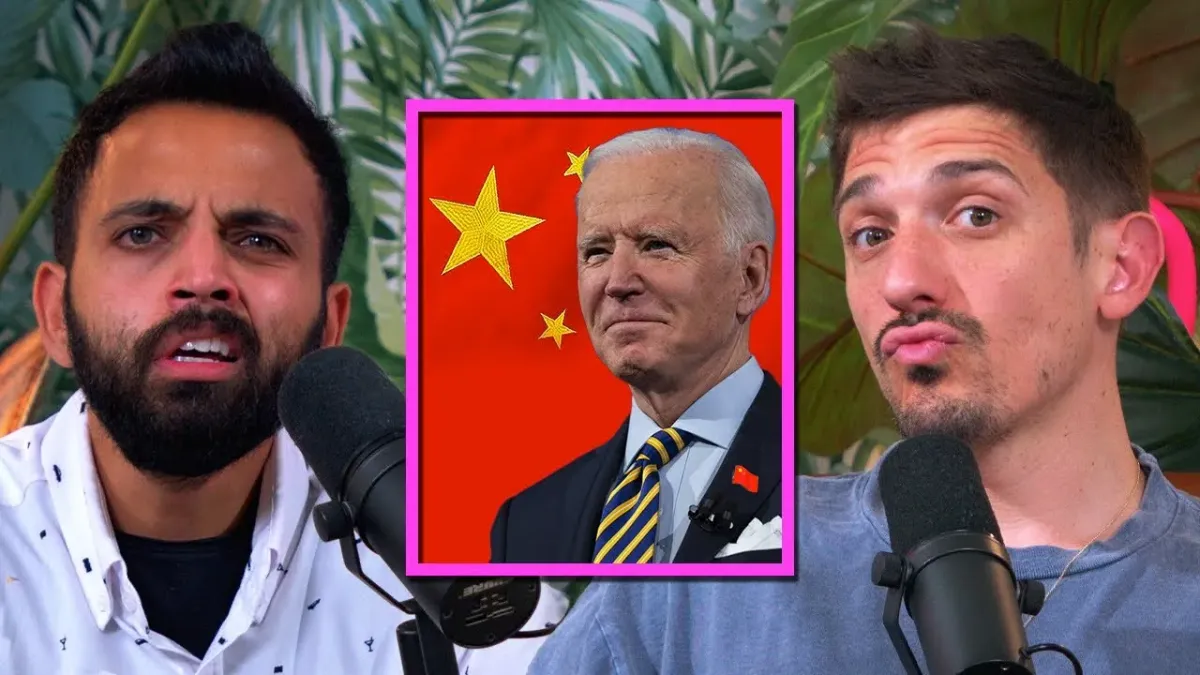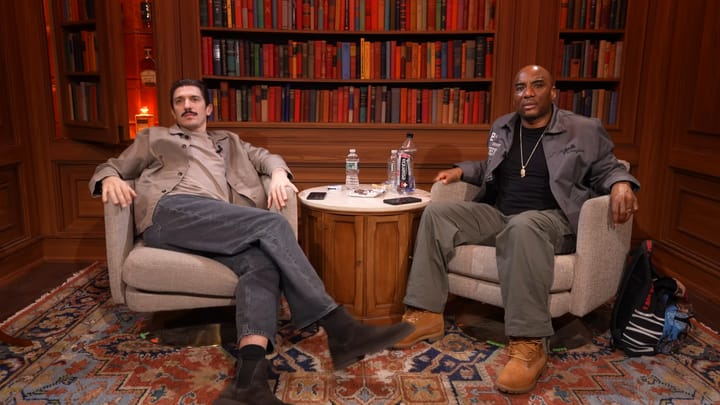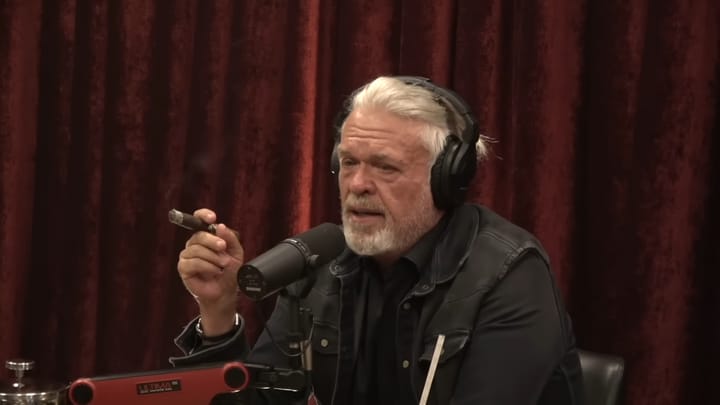Trumpism's Cultural Vanguard
Some belated thoughts.

I wish I were better at writing through times of stress and heartbreak, but the words just haven’t been coming. Like most people who read this newsletter, I suspect, I was crushed by the results of the election. I hoped things would go differently and now I’m pained at the memory of that hope. With the eternal caveat that I don’t know anything about anything, I’ll try to share a few thoughts about the state of play, at least as it pertains to our usual subject matter.
A few people emailed me in the wake of Tony Hinchcliffe’s disastrous set that Trump’s rally in New York City. At the time, I was reluctant to opine on the affair beyond what was self-evident: it was hideously racist, completely predictable, and honestly pretty funny how poorly it played in the room and how quickly the right turned on Hinchcliffe. Whether it reflected a final nail in the coffin of a doomed campaign or a dark preview of the world to come, I preferred to wait and see. Now we know.
I haven’t been able to bring myself to watch any of the post-election podcasts released by the usual suspects I keep track of here. I’m sure they’re all thrilled. Their guy won, their embrace of him has been vindicated, their ghoulish politics affirmed. If you’ll allow some speculation, I predict we will see two broad trends in the coming months and years. One, all these people will double down on their explicit, on-camera bigotry with diminishing pushback from left-of-center spheres, which already gave up on policing bigotry long ago. Two, they will continue scoffing at any suggestion that comedy has ideological or political influence, even as their association with political figures becomes all the more blatant. They didn’t give us Trump, they’ll say: the voters did.
Which is true, of course. I’m not so delusional as to believe Trump won because he went on Joe Rogan’s podcast (and Theo Von’s, and Andrew Schulz’s…). To my eye, the appropriate way to view his campaign’s podcast blitz is as an affirmation of the comedy podcast’s role in conservative media more broadly. These shows are Fox News without the stigma of the Establishment. This makes them much more trustworthy to their viewers while removing what little quality control remains in corporate news. Fox News producers still, somehow, get fired when they’re exposed as sex predators or white supremacists. Comedians do not, which makes them appear, like Trump, all the more powerful and credible to their fans.

As usual, I am less interested Joe Rogan and his ilk’s influence over national politics than their influence over comedy itself. By narrowing the scope, we can speak with a little more certainty about what happened over the last few months, which is this: some of the most famous comedians in the world overtly aligned themselves with fascism. Tony Hinchcliffe performed at a Nazi rally. Joe Rogan endorsed the candidate who said he’d be a dictator on day one and that he wanted generals like Hitler’s. Tim Dillon helped JD Vance pitch the mass deportations that will soon cause unspeakable horror across the country. Theo Von sat down for friendly chats with an insurrectionist and a guy who said Haitian immigrants are eating cats. Andrew Schulz gave Trump a space to soften his stance on abortion and lie about the 2020 election.
Comedy’s biggest names are fascists. There is no other art form and no other cultural industry you can say this about. Here’s how Marc Maron put it before the election:
The anti-woke flank of the new fascism is being driven almost exclusively by comics, my peers. Whether or not they are self-serving or true believers in the new fascism is unimportant. They are of the movement. Whether they see themselves as acolytes or just comics doesn’t matter. Whether they are driven by the idea that what they are fighting for is a free speech issue or whether they are truly morally bankrupt racists doesn’t matter. They are part of the public face of a fascist political movement that seeks to destroy the democratic idea.
When comedians with podcasts have shameless, self-proclaimed white supremacists and fascists on their show to joke around like they are just entertainers or even just politicians, all it does is humanize and normalize fascism. When someone uses their platform for that reason they are facilitating anti-American sentiment and promoting violent autocracy.
Again, I’m not particularly interested in these podcasters’ impact on electoral outcomes. What seems inarguable to me, as Maron says, is that they are of the movement. They have transformed their own cultural milieux into hotbeds of reactionary ideology, and they have built their platforms into powerful vectors for propaganda. Because they’re entertainers, they have done this largely free of scrutiny or criticism, in most cases maintaining their reputations as heterodox thinkers who speak for the common man—this despite the fact that they are multimillionaires to a tee. Thanks to them, the comedy industry now operates as Trumpism’s cultural vanguard, even in liberal cities that might otherwise reject it. You can see Akaash Singh and Matt McCusker in the New York Comedy Festival this week; Andrew Schulz headlines at the Beacon Theatre later this month.
If there is a silver lining to any of this, I think it may be what it’s always been: comedy is an industry, and industries can be organized. You cannot change the world, but you can change the spaces you work in and move through. In comedy, one side has availed itself of this power with little resistance from the other. Maybe the moment to change that has long past, or maybe it’s finally come.



